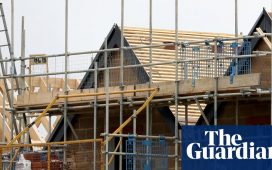As the clock ticks down to the start of Los Angeles’ new “mansion tax”, the city’s real estate market is offering some deadline deals.
On Instagram, two high-end realtors touted a $1m bonus to any agent who helped sell a $28m Bel Air mansion by 1 April. Another 260-acre Bel Air property which went up for auction this month (starting price $39m) offered buyers a $2m credit if they were able to close the deal by 31 March.
In Beverly Hills, a listing for a $16.5m mansion offered buyers “a brand new” luxury car – Aston Martin, Bentley or McLaren – if they purchased the property before the deadline.
The new tax, designed to raise public funds to prevent homelessness in one of the most expensive housing markets in the country, imposes a 4% tax on property sales between $5m and $10m, and a 5.5% tax on sales over $10m.

Voters approved the tax in November, amid a growing humanitarian crisis that has left more than 28,000 people unhoused and living outside in Los Angeles. Real estate interests are now fighting the new law in court, arguing that it violates California’s constitution.
With the outcome of the legal challenge unknown, the real estate market is adjusting to the expected tax, with buyers and sellers exploring new workarounds.
Some properties that might have been priced in the low $5m range are now being marketed at $4.9m, just under the tax cutoff, with buyers agreeing to pay a property’s closing costs instead of the sellers, said Ken Fields, a Los Angeles real estate attorney.
With pricier properties, “There has definitely been a push to sell before the deadline to avoid the tax,” he said. “I can think of several deals where the sellers have termination rights if the transaction doesn’t close by the deadline.”
Proponents of the new wealth tax are not impressed. “Multimillionaires are giving away luxury cars to get out of a tax that helps people sleeping in their cars,” Peter Dreier, an urban policy expert, told the LA Times.
Within the industry, the marketing of the new measure as a “mansion tax” is contested, both because it also applies to commercial real estate deals and because many believe that a $5m house in Los Angeles may no longer qualify as a mansion. Over the past year, the median sale price for a house in the city has hovered close to $1m.

True luxury properties in the Los Angeles area now start at around $10m, according to real estate agent Scott Tamkin.
“Five million dollars is certainly not luxury. It’s a nice house, in a nice area. It’s not what most people would consider a luxury house in a prime area,” Tamkin said.
“It’s really quite shocking, honestly, the fact that $5m is not a luxury home,” he added. In many places in the US, he said, not a single house on the market costs as much as $5m.
Since last year, California’s fiercely competitive housing market has seen prices decrease slightly and sales slow. Some of the most extravagant residential properties have seen their listing prices drop, and drop again. An infamous Bel Air mansion, a property larger than the White House with an original price point of $500m, sold last year at auction for only $141m.
after newsletter promotion
Senderos Canyon, the 260-acre Bel Air property which represents “6% of BelAir’s total land area”, saw its asking price drop from $125m to an initial bid of only $39m, a nearly 70% discount. (The owner of Senderos Canyon was still reviewing bids after a mid-March auction, and it was not clear if any deal would close before 1 April, Tamkin, one of the property’s real estate agents, said.)
While the “mansion tax” was initially projected to bring Los Angeles revenue of nearly $1bn each year, the city’s financial analysts recently lowered that projection to only $672m a year as the market has cooled slightly, the real estate website the Real Deal reported.
That’s still substantially more public revenue than Los Angeles’ current transfer tax on properties generates, which has brought in only about $200m annually in recent years, according to a report by researchers at the University of California, Los Angeles.

Proponents of the “mansion tax” estimated that, over the next decade, the new revenue could help fund 26,000 affordable housing units and provide tens of thousands of residents with emergency rental assistance, income support and legal assistance to fight evictions.
Fields, the real estate attorney, said he expected to see a “chilling effect on transactions” while buyers and sellers wait to see if the lawsuit against the “mansion tax” succeeds. “This tax has nothing to do with your profit,” Fields said. “You could be selling at a loss and still have to pay the tax.”
But if the tax survives the litigation against it, developers of affordable housing can expect to benefit from the greater public investment in building lower-cost homes, he added.
The rise of Los Angeles as a global financial center, not just a film and entertainment hub, has fundamentally transformed the city’s real estate market and its prices, Tamkin, the real estate agent, said.
He argued that some of the attention to the 1 April deadline was being “overhyped”, and noted that the tax was most likely to have an impact on people buying lower-end mansions or those “nice” $5m homes.
“In the ultra-luxury market, it’s not really going to have much of an impact, to be honest,” Tamkin said. “A $4.4m tax on an $80m sale is less of a sting than a $200,000 tax on a $5m sale.”











